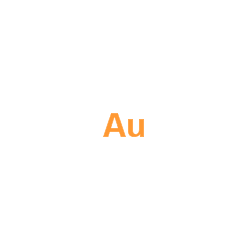17083-68-0
| 中文名 | 四溴金酸氢盐(III)水合物 |
|---|---|
| 英文名 | Aurate(1-),tetrabromo-, hydrogen |
| 英文别名 | EINECS 241-139-9 |
| 分子式 | AuBr4- |
|---|---|
| 分子量 | 516.58300 |
| 精确质量 | 512.64000 |
| 储存条件 | 密闭于阴凉干燥环境中 |
| 稳定性 | 遵照规定使用和储存则不会分解。 |
| 分子结构 | 1、摩尔折射率:无可用 2、 摩尔体积(cm3/mol):无可用 3、 等张比容(90.2K):无可用 4、 表面张力(dyne/cm):无可用 5、 极化率:无可用 |
| 计算化学 | 1.疏水参数计算参考值(XlogP):无 2.氢键供体数量:0 3.氢键受体数量:4 4.可旋转化学键数量:0 5.互变异构体数量:无 6.拓扑分子极性表面积0 7.重原子数量:6 8.表面电荷:0 9.复杂度:0 10.同位素原子数量:0 11.确定原子立构中心数量:0 12.不确定原子立构中心数量:0 13.确定化学键立构中心数量:0 14.不确定化学键立构中心数量:0 15.共价键单元数量:6 |
| 更多 | 1. 性状:无可用 2. 密度(g/mL,25/4℃):无可用 3. 相对蒸汽密度(g/mL,空气=1):无可用 4. 熔点(ºC):无可用 5. 沸点(ºC,常压):无可用 6. 沸点(ºC,5.2kPa):无可用 7. 折射率:无可用 8. 闪点(ºC):无可用 9. 比旋光度(º):无可用 10. 自燃点或引燃温度(ºC):无可用 11. 蒸气压(kPa,25ºC):无可用 12. 饱和蒸气压(kPa,60ºC):无可用 13. 燃烧热(KJ/mol):无可用 14. 临界温度(ºC):无可用 15. 临界压力(KPa):无可用 16. 油水(辛醇/水)分配系数的对数值:无可用 17. 爆炸上限(%,V/V):无可用 18. 爆炸下限(%,V/V):无可用 19. 溶解性:无可用 |
|
Section 1: Product Identification Chemical Name:Hydrogen tetrabromoaurate (III) hydrate (99.9%-Au) CAS Registry Number:17083-68-0 Formula:HAuBr4.XH2O EINECS Number:241-139-9 Chemical Family:metal acid halide Synonym:Aurate(1-), tetrabromo-, hydrogen, (SP-4-1)-
Section 2: Composition and Information on Ingredients IngredientCAS NumberPercentACGIH (TWA)OSHA (PEL) Title Compound17083-68-0100%no datano data Section 3: Hazards Identification Corrosive to skin, eyes, and respiratory tract. Exposure to gold compounds may damage kidney function and Emergency Overview: reduce blood cell count. Primary Routes of Exposure:Ingestion, inhalation, skin, eyes Eye Contact:Causes burns to the eyes. Skin Contact:Causes burns to the skin. Inhalation:Dust is corrosive to the nose, mucous membranes and respiratory tract. Causes burns to the gastrointestinal system. Gold compounds may lead to dermatitis, metallic taste, and Ingestion: convulsions. Corrosive to eyes, skin and respiratory tract, May impair kidney and bone marrow functions and cause Acute Health Affects: abdominal cramps, vomiting bloody diarrhea, weakness and convulsions. Chronic Health Affects:Prolonged exposure to gold compounds may lead to reduced red and white blood cell generation. NTP:No IARC:No OSHA:No SECTION 4: First Aid Measures Immediately flush the eyes with copious amounts of water for at least 10-15 minutes. A victim may need Eye Exposure: assistance in keeping their eye lids open. Get immediate medical attention. Wash the affected area with water. Remove contaminated clothes if necessary. Seek medical assistance if Skin Exposure: irritation persists. Remove the victim to fresh air. Closely monitor the victim for signs of respiratory problems, such as difficulty Inhalation: in breathing, coughing, wheezing, or pain. In such cases seek immediate medical assistance. Seek medical attention immediately. Keep the victim calm. Give the victim water (only if conscious). Induce Ingestion: vomiting only if directed by medical personnel. SECTION 5: Fire Fighting Measures Flash Point:not applicable Autoignition Temperature:none Explosion Limits:none Extinguishing Medium:none required If this product is involved in a fire, fire fighters should be equipped with a NIOSH approved positive pressure Special Fire Fighting Procedures: self- contained breathing apparatus and full protective clothing. Hazardous Combustion andIf involved in a fire this material may emit toxic bromine and hydrobromic acid fumes. Decomposion Products: Unusual Fire or Explosion Hazards: No unusual fire or explosion hazards. SECTION 6: Accidental Release Measures To avoid raising dust, small spills may be mixed with diatomaceous earth, sand, vermiculite, or other suitable Spill and Leak Procedures: inert material and swept up. SECTION 7: Handling and Storage Handling and Storage:Store in a cool, dry place in a tightly sealed container. SECTION 8: Exposure Controls and Personal Protection Eye Protection:Always wear approved safety glasses when handling a chemical substance in the laboratory. Skin Protection:Wear protective clothing and gloves. Consult with glove manufacturer to determine the proper type of glove. Ventilation:Material may form a fine dust. Handle the material in an efficient fume hood. If ventilation is not available a respirator should be worn. The use of respirators requires a Respirator Respirator: Protection Program to be in compliance with 29 CFR 1910.134. Ventilation:Material may form a fine dust. Handle the material in an efficient fume hood. Additional Protection:No additional protection required. SECTION 9: Physical and Chemical Properties Color and Form:black xtl Molecular Weight:517.61 Melting Point:no data Boiling Point:no data Vapor Pressure:not applicable Specific Gravity:no data Odor:none Solubility in Water:very soluble SECTION 10: Stability and Reactivity Stability:moisture sensitive Hazardous Polymerization:no hazardous polymerization Conditions to Avoid:none Incompatibility:active metals and strong bases Decomposition Products:hydrogen bromide, bromine, and gold salts SECTION 11: Toxicological Information RTECS Data:No information available in the RTECS files. Carcinogenic Effects:No data Mutagenic Effects:No data Tetratogenic Effects:No data SECTION 12: Ecological Information Ecological Information:No information available SECTION 13: Disposal Considerations Disposal:Dispose of according to local, state and federal regulations. SECTION 14: Transportation Shipping Name (CFR):Corrosive solids, N.O.S. Hazard Class (CFR):8 Additional Hazard Class (CFR):NA Packaging Group (CFR):II UN ID Number (CFR):UN #1759 Shipping Name (IATA):Corrosive solids, N.O.S. Hazard Class (IATA):8 Additional Hazard Class (IATA):NA Packaging Group (IATA):II UN ID Number (IATA):UN #1759 SECTION 15: Regulatory Information TSCA:Listed in the TSCA inventory. SARA (Title 313):Title compound not listed. Second Ingredient:None SECTION 16 - ADDITIONAL INFORMATION N/A |
|
生态学数据: 该物质对环境可能有危害,对水体应给予特别注意。
|
| 上游产品 0 | |
|---|---|
| 下游产品 1 | |



